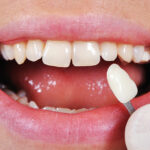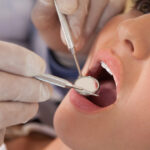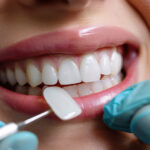Experiencing increased tooth sensitivity, noticing a dullness in your smile, or observing a slight yellowing of your teeth? These could be early signs of dental erosion, a serious condition that silently chips away at your precious enamel. Understanding Dental Erosion Treatment options is crucial for addressing this issue and protecting your oral health.
Unlike cavities caused by bacteria, dental erosion is the chemical breakdown of tooth enamel due to frequent acid exposure. This insidious process can significantly impact your oral health, leading to pain, discomfort, and even tooth loss if left untreated.
In this comprehensive guide, we’ll delve into the intricacies of dental erosion: its causes, symptoms, and most importantly, effective treatment options. We’ll also provide valuable prevention tips to safeguard your smile and maintain optimal oral health.
Understanding Dental Erosion: A Closer Look
Tooth enamel, the hard, outer layer of your teeth, is the strongest substance in the human body. However, it’s not invincible. Acids from various sources can gradually dissolve this protective shield, exposing the sensitive dentin layer beneath.
Common Causes of Dental Erosion:
- Acidic Foods and Drinks:
- Citrus fruits: Lemons, oranges, grapefruits
- Carbonated beverages: Soda, sparkling water
- Wine: Red wine, white wine
- Sports drinks: High in sugar and acids
- Fruit juices: Apple juice, orange juice
- Gastrointestinal Issues:
- Acid reflux: Stomach acid travels back up the esophagus and into the mouth.
- Bulimia: Frequent vomiting exposes teeth to stomach acid.
- Medications:
- Certain medications can cause dry mouth, increasing the risk of acid attacks.
- Occupational Hazards:
- Workers in certain industries may be exposed to acidic substances.
Recognizing the Signs of Dental Erosion:
- Increased Tooth Sensitivity: Experiencing pain when consuming hot, cold, or sweet foods and drinks.
- Tooth Discoloration: Teeth may appear dull, yellowed, or even translucent.
- Notch-like Defects: Small, V-shaped grooves may appear on the biting edges of your teeth.
- Rough Tooth Surface: Enamel loss can lead to a rough, pitted texture.
Dental Erosion Treatment
The treatment approach for dental erosion will depend on the severity of the condition and its underlying cause. Here are some common treatment options:
- Fluoride Treatments:
- Fluoride toothpaste: Daily use can help remineralize weakened enamel.
- Fluoride mouthwash: Rinsing with fluoride mouthwash can provide additional protection.
- Professional fluoride treatments: In-office applications of fluoride varnishes or gels can significantly strengthen enamel.
- Dietary Modifications:
- Limit acidic foods and drinks: Reduce consumption or dilute acidic beverages with water.
- Use a straw: Minimize contact between acidic drinks and your teeth.
- Rinse mouth with water after consuming acidic foods or drinks.
- Saliva Substitutes:
- Dry mouth can exacerbate dental erosion. Saliva substitutes can help restore moisture and neutralize acids.
- Restorative Dentistry:
- Dental fillings: Used to fill cavities caused by erosion.
- Dental crowns: Placed over damaged teeth to restore their strength and appearance.
- Dental veneers: Thin shells of porcelain placed over the front surface of teeth to improve their appearance and protect them from further erosion.
Prevention is Key: Protecting Your Smile
The best course of action is to prevent dental erosion from occurring in the first place. Here are some proactive steps you can take:
- Maintain excellent oral hygiene: Brush twice daily with a fluoride toothpaste and floss regularly.
- Schedule regular dental checkups: Routine dental exams allow your dentist to identify and address any early signs of erosion.
- Limit acidic food and drink consumption: Be mindful of your dietary choices and choose water as your primary beverage.
- Use a straw: When consuming acidic drinks, use a straw to minimize contact with your teeth.
- Neutralize acids: Rinse your mouth with water after consuming acidic foods or drinks.
- Quit smoking: Smoking can dry out your mouth and increase your risk of dental erosion.
The Role of Madison Dentistry & Implant Center
At Madison Dentistry & Implant Center, we are committed to providing comprehensive and personalized dental care. Our experienced team of dentists can accurately diagnose dental erosion, recommend the most suitable treatment options, and guide you in developing a personalized prevention plan.
We understand that every patient is unique, and we tailor our treatment approach to meet your specific needs and goals.
Conclusion
Dental erosion is a serious dental condition that can have a significant impact on your oral health and overall well-being. By understanding the causes, recognizing the symptoms, and taking proactive steps to prevent and treat this condition, you can protect your smile and maintain optimal oral health for years to come.
Remember, early detection and intervention are crucial for successful treatment outcomes. Schedule a consultation with Madison Dentistry & Implant Center today to discuss your concerns and learn more about how we can help you safeguard your smile.




